
Towards the leading College of Law and Justice in Africa
The International Criminal Court (ICC) has come under sharp criticism from African leaders for supposedly targeting Africans for prosecution. The ICC has, however, defended its prosecutions, arguing that it is Africans who send fellow Africans to The Hague for trial. To contribute to the ongoing debate on peace, justice and reconciliation, the seventh annual Thabo Mbeki Africa Day lecture on 27 May 2016, which took place at Unisa, focused on Africa and the ICC.
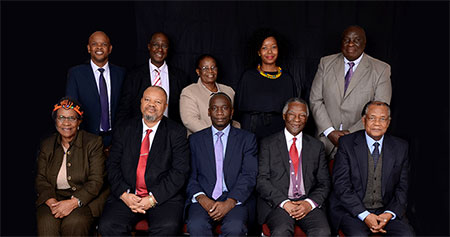
At the seventh annual Thabo Mbeki Africa Day lecture on 27 May 2016 at Unisa: Back: Max Boqwana (CEO: Thabo Mbeki Foundation), Prof Barney Pityana (Human rights lawyer and theologian and former Principal and Vice-Chancellor: Unisa), Dr Daphney Ngoepe (wife of Bernard Ngoepe), Ottilia Maunganidze (Human rights advocate and Senior Researcher: Institute for Security Studies), Prof Laurence Juma (Professor of International Law and Deputy Dean: Faculty of Law, Rhodes University), and, front, Dr Brigalia Bam (Chairperson: Thabo Mbeki Foundation), Prof Mandla Makhanya (Principal and Vice-Chancellor, Unisa), Judge Barney Afako (Ugandan lawyer and expert on transitional justice), Thabo Mbeki (Patron of the Thabo Mbeki Foundation and former President of South Africa), and Bernard Ngoepe (Chancellor of Unisa).
Appropriately themed The International Criminal Court (ICC) in Africa and Africa’s quest for peace and justice, the lecture was delivered by Judge Barney Afako, Ugandan lawyer and expert on transitional justice.
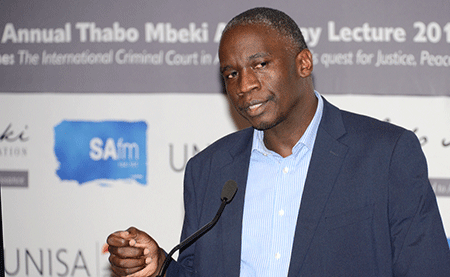
Judge Barney Afako (Ugandan lawyer and expert on transitional justice) has worked in the fields of human rights and criminal justice in Uganda, Zimbabwe and the United Kingdom. Previous roles have included acting as a consultant on peace talks for civil society, the Ugandan Amnesty Commission and the government. He is one of the leading legal analysts of the International Criminal Court investigation in northern Uganda. Afako is also a part-time immigration judge in the United Kingdom.
After listening to judges and lawyers debating the issue, Afako said that he wished we were debating the broader questions of how we bring about the transformation of conflict in a principled manner. He pointed out that the question of who determines the form and content of justice at an international level is intensely political. “This is when you realise you cannot leave these matters to judges and lawyers,” he said.
So what is it that Africa brings to this discussion of accountability and peace? Afako believes that in dealing with conflict, and seeking to address the matter of accountability, context is very important. “I don’t know a conflict in Africa that isn’t political, that isn’t a contestation of being recognised within a country, that isn’t about marginalisation. Contestation is political and the danger with international justice is that it depoliticises this continent,” he said.
Afako is calling for a greater analysis of these issues and believes think-tanks like the Thabo Mbeki Foundation (TMF) should develop thinking on these issues. “They should also mobilise Africans and those who support the aspirations of this continent to strike the right balance between the pursuit of peace and justice.” “Let us civilise international criminal law by infusing it with restorative principles derived from African cultures,” Afako added.
So what should Africans be taking away from this discussion? “We must return to the key quest of how to repress the challenges that Africa is facing and how we are to determine the proper place of justice in that course. We need to do this systematically, drawing on African principles and priorities,” Afako explained. “We should be tenacious in our insistence that Africans will shape the direction of justice and peace on the continent,” he further said.
A key question that keeps coming up is whether Africa should stay in the ICC system. Thabo Mbeki, patron of the Thabo Mbeki Foundation and former President of South Africa, said that he takes the position of the African Union (AU) on this matter. He explained that what we should be looking into is setting up a committee of foreign resistance. “I think it’s important to point out that there’s nobody on the continent who has said we don’t want the ICC in principle. But people have said that there are certain things that need to change in the manner in which the ICC operates and they have made proposals about it,” Mbeki explained.
Focusing on Africa’s quest for justice, and what needs to be done in terms of international crimes on the African continent was Ottilia Maunganidze, human rights advocate and Senior Researcher at the Institute for Security Studies. “On the African continent we do need to be addressing the need for peace, security and justice. Ultimately it’s those things that we’re yearning for in order to achieve prosperity, development and for me to feel safe when I leave this room. It requires that the environment in which I exist is peaceful. I’m speaking about myself as an African citizen,” she said. “When I speak about what Africa needs to do, I’m not speaking about what African leaders need to do. I’m speaking about what African citizens need to do like myself who aren’t leaders,” Maunganidze added.
According to the Prof Mandla Makhanya, Principal and Vice-Chancellor at Unisa, the subject of this lecture is very appropriate right now given the recent and current developments on the African continent. He pointed out last year’s African Union Summit where African leaders critically reflected on the ICC. Their verdict was that it seemed to have taken a profoundly troubling detour from the noble original position given the apparent bias towards the African leaders. The VC also believes that the seismic shifts in global politics are surely going to impact on international criminal justice, as well as on Africa’s quest for peace and justice.
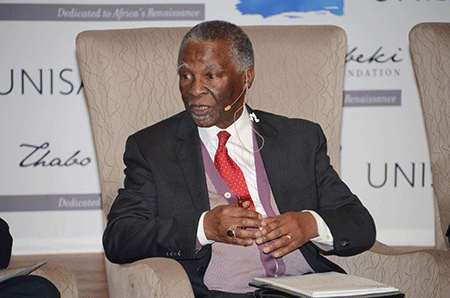
Thabo Mbeki (patron of the Thabo Mbeki Foundation and former President of South Africa) at the 7th Thabo Mbeki annual Africa Day lecture.
Africa Day, the annual commemoration of the founding of the Organisation of African Unity (OAU), is widely commemorated on the African continent but does not receive much attention and recognition in South Africa. The Thabo Mbeki Africa Day lecture is held annually at Unisa to fill this gap, with the principal objectives including the mobilisation of all sections of South African society to observe and commemorate Africa Day with the rest of the continent. The Africa Day lecture is an integral part of the vision shared by Unisa and the Thabo Mbeki Foundation of working towards the renewal of the continent, utilising Thabo Mbeki African Leadership Institute as a vehicle for the advancement of this vision.
*By Kirosha Naicker
Publish date: 2016-05-30 00:00:00.0
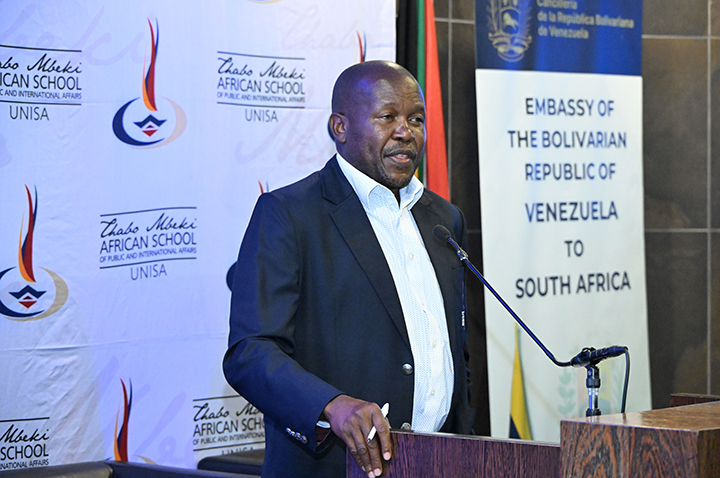 Unisa seminar examines breach of the international legal framework
Unisa seminar examines breach of the international legal framework
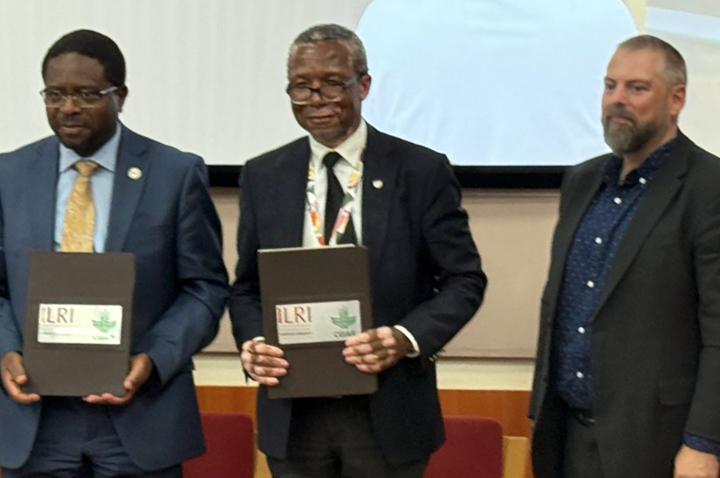 Unisa and ILRI sign landmark MoU to advance Africa's genomic leadership
Unisa and ILRI sign landmark MoU to advance Africa's genomic leadership
 AMT to strengthen global black hole imaging and advance African astrophysics
AMT to strengthen global black hole imaging and advance African astrophysics
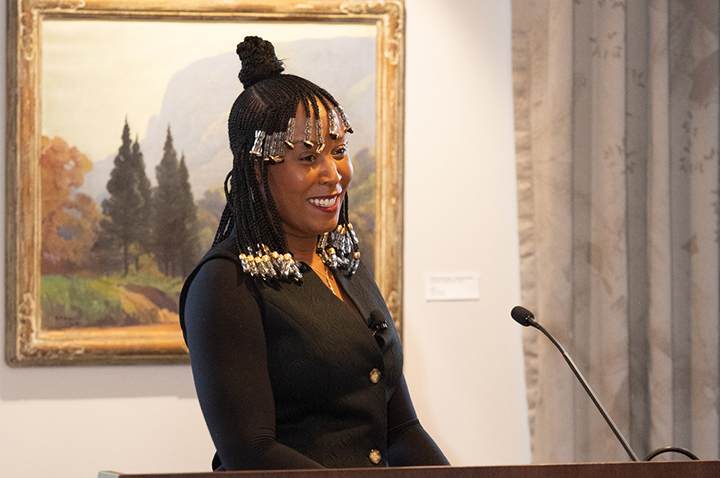 Unisan awarded Presidential Fellowship at American university
Unisan awarded Presidential Fellowship at American university
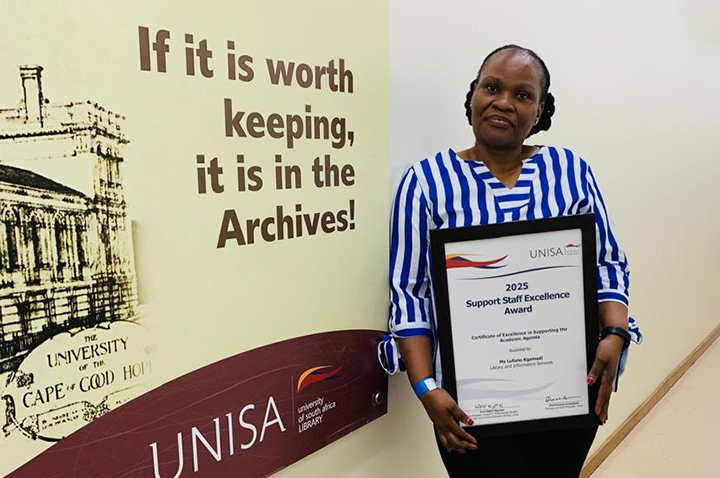 Scholar-practitioner excellence recognised at Unisa
Scholar-practitioner excellence recognised at Unisa